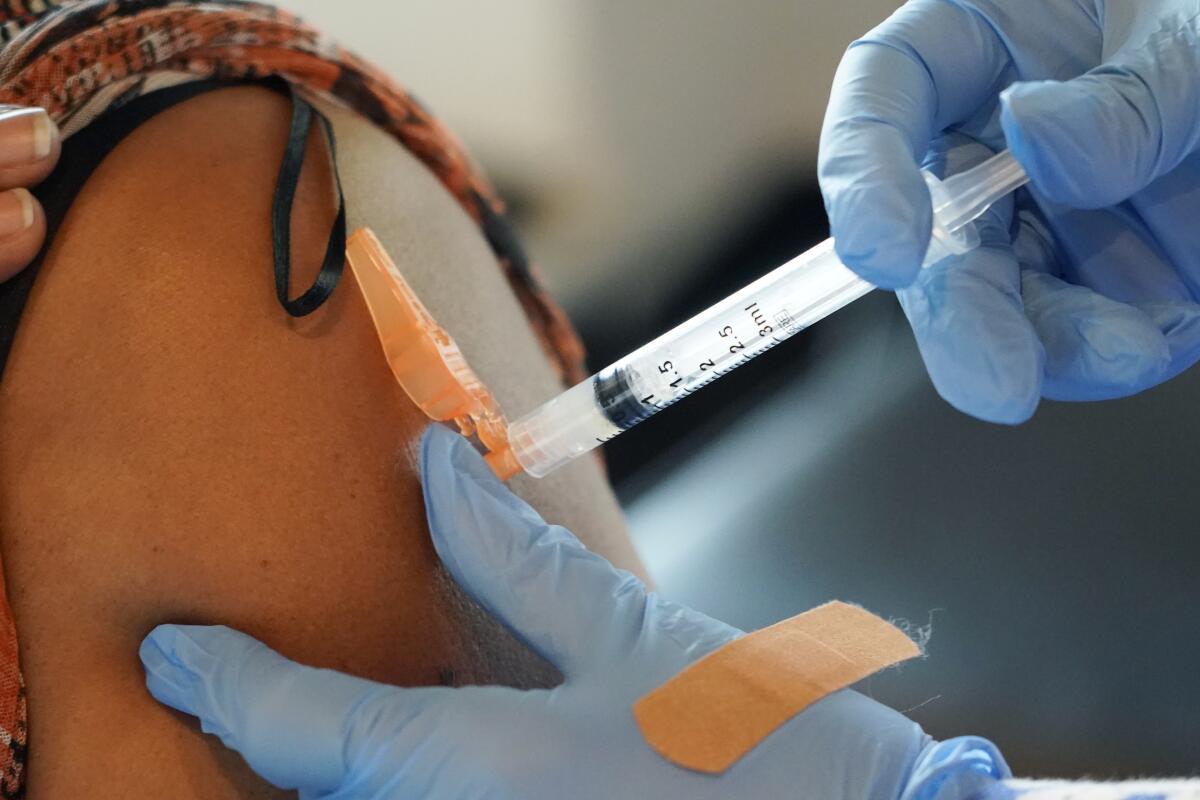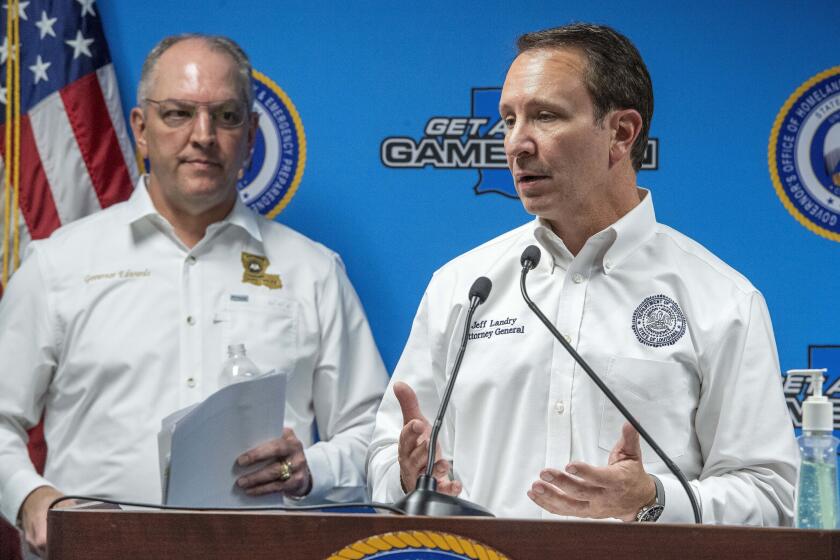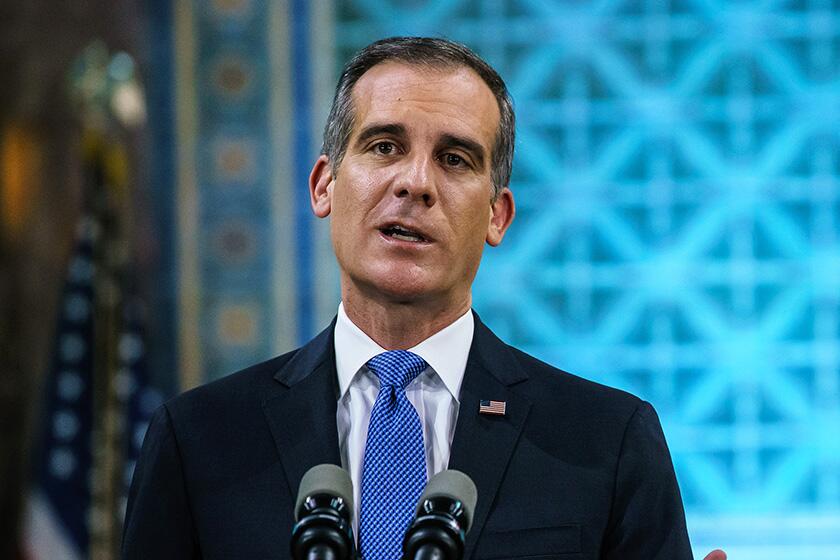Op-Ed: OSHA suspended its vaccine rule after judges got it wrong

The decision by federal appeals judges to block the Biden administrationâs rule requiring vaccination or testing for companies with at least 100 employees shows that some courts in the United States do not consider COVID-19 to be a serious issue.
The administration has since suspended enforcement of its rule. The judges, by ignoring reality, are failing us.
A federal appeals court has temporarily halted the Biden administrationâs COVID-19 vaccine requirement for businesses with 100 or more workers.
When a court does not consider over 750,000 COVID-19 deaths, tens of millions of cases and the direct economic losses of the pandemic in assessing the effect of a mandate on the public interest, we are in trouble.
The Biden administrationâs Occupational Safety and Health Administration issued an emergency temporary standard on Nov. 5 requiring large private employers to adopt a vaccinate-or-test plan. The day after, the 5th Circuit Court of Appeals stayed OSHA from enforcing the rule, and on Nov. 12 it reaffirmed the stay in a problematic decision.
OSHA announced Wednesday it will not enforce the rule until courts remove the stay. Since at least 34 lawsuits have been filed nationwide challenging the rule, a lottery conducted by a federal judicial panel assigned the issue to the 6th Circuit appeals court in Cincinnati, removing it from the 5th Circuit in New Orleans. The cases are likely to reach the Supreme Court.
Politicization of the COVID-19 pandemic has already cost the United States dearly. We have 4% of the worldâs population yet more than 15% of the worldâs deaths, and are still seeing high rates of death daily.
Part of our problem is that Americans in different political parties have radically different views of the pandemic and its risks, on top of political disagreements on what is the right response. This schism contributed to, among other things, low vaccine uptake particularly in Republican states.
But so far, partisanship has not affected the courts as much. By and large, courts have acknowledged the significant harms of COVID-19 and â with the exception of cases involving freedom of religion â given public health officials room to deal with the challenge. This is in line with historical practice. During public health emergencies, courts have often allowed authorities to limit rights in order to protect public health, for outbreaks as different as HIV, smallpox and measles.
Judges appointed by both Republican and Democratic presidents have upheld COVID-19 vaccine mandates imposed by universities and employers and have even blocked a state law banning mandates, to allow a cruise ship company to require proof of vaccination from passengers.
Dozens of Los Angeles city employees are now going unpaid after refusing to sign notices that directed them to get COVID-19 vaccines by a December deadline, Mayor Eric Garcetti said Wednesday.
OSHAâs rule, which is effectively a mandate, raises real questions about the extent of the agencyâs power to regulate the workplace, and the division of responsibilities between the federal government and the states, that go beyond the pandemic context. There are legitimate debates on these issues. The legal standard OSHA needs to meet for an emergency temporary rule is high. I think this rule likely meets them, though people can reasonably disagree on that issue.
But the 5th Circuit did not just say the rule did not meet the standard. It completely downplayed the fact that COVID-19 is still killing and harming Americans.
The court referred to COVID-19 as a âpurportedâ emergency. It ruled that COVID-19 does not pose a grave danger because âthe Mandate itself concedes that the effects of COVID-19 may range from âmildâ to âcritical.ââ The three-judge panel nowhere mentioned that OSHA explained that the rule can prevent 6,500 deaths and 250,000 hospitalizations by the lowest estimates.
In addressing the balance of harms â comparing the harms of imposing the rule versus putting it on hold â the court focused on the economic impacts, noting âthe mere specter of the Mandate has contributed to untold economic upheaval in recent months.â And it argued that âthe public interest is also served by maintaining our constitutional structure and maintaining the liberty of individuals to make intensely personal decisions according to their own convictions.â It did not mention the devastating effects to public health that could be prevented.
This is not a single panelâs aberration, either. Three Supreme Court justices dissented in a case where the majority of the court allowed a Maine vaccine mandate without a religious exemption to stand. Their dissent similarly omitted the harms of COVID-19, and expressed doubts on whether COVID-19 is an emergency.
When federal judges do not acknowledge deaths and illnesses from a pandemic as relevant to the public interest or worthy of mention, it is unsurprising that they will not allow policymakers to act against those dangers.
Ignoring COVID results in judicial decisions that are detached from reality. The coronavirus does not care about politics or the borders between red states and blue states. Judges who refuse to consider its harms fail in their duty to all of us.
Dorit Reiss is a professor at UC Hastings College of the Law. @doritmi
More to Read
A cure for the common opinion
Get thought-provoking perspectives with our weekly newsletter.
You may occasionally receive promotional content from the Los Angeles Times.












